—————————————————————————————————————————————————————————————————————
Committee Assembly Days and Survey Results
 Dear friends and neighbors, Dear friends and neighbors,
As we start to wrap up 2023, next year’s legislative session is right around the corner. Earlier this week the House had its Committee Assembly Days, one of the only times all the legislators are down in Olympia outside of session. Committee Assembly days happen every year in late fall, and the time is used for legislative committees to meet and for legislators to touch base about their work in the coming session. It was great to see everyone and to get a preview about all the good work to come. We’re still finalizing our priorities as a caucus, and I’ll be sharing more about those soon. In the meantime, I wanted to report back some of the results from our recent constituent survey. I’m grateful that so many people took the time to let me know their priorities. We received over 500 responses from around the district! The top four priorities identified for the upcoming session were housing and homelessness, community safety, gun violence reduction, and behavioral health. Many of you also gave responses to clarify your priorities in each area, and we’re compiling that data as well. It’s truly helpful for me to hear from so many in our community, and it’s front of mind as we work on the priority areas for House Democrats this session. Thank you all again for taking time out of your day to do things like fill out the survey or read these updates. It’s truly an honor to serve you all in the legislature.
|
Food Assistance Availability
 Dear friends and neighbors, Dear friends and neighbors,
As we head into the holidays I wanted to take some time to talk about the resources available (below) for anyone facing food insecurity. We know that nearly 700,000 people in Washington don’t have consistent access to enough food for everyone in their household. Last session we passed legislation to help meet the need left by reduced federal funding, we expanded free school meals to 90,000 additional students, and removed barriers for college students to access basic needs like food, water, housing and childcare. We invested $95 million in food assistance programs, $81 million for refugee supports, and $44 million to fund an increase for Temporary Assistance for Needy Families (TANF), and other cash assistance programs. We also invested $19 million in TANF for diaper subsidies and a time limit extension. This is good work, but there’s more to do next session. In the meantime, if you or your family would be helped by any of these food or cash assistance programs, I have more information below. |

|
|

To learn more about temporary assistance for needy families (TANF) click here.
To learn more about food assistance (called Basic Food in Washington, also known as Supplemental Nutrition Assistance Program or SNAP) click here.
To apply for either/both TANF or Basic Food, or other state assistance programs, click here.
To learn more about food banks in Pierce County click here. To find your closest food bank click here. (This includes Nourish Pierce County food banks, you can find more information about their food banks and what to expect here.)
To sign up for home delivery of food assistance click here.
|
|

I also wanted to pass along a reminder that the House Page Program has started accepting applications for next session. This is an opportunity for students ages 14-17 to come to Olympia for a week and learn more about how our state legislature works. Students page for one week at a time, attending a Page School to learn more about the legislative process and supporting the operations of the House during floor action and with other daily tasks. Pages also receive a stipend for their time and can earn community service hours.
You can learn more about the program here, and apply for the page scholarship here. Interested students should complete an application as soon as possible – the 2024 session only runs for 60 days and the first pages will serve the week of January 8-12.
The Page Program, 2024 Legislative Priorities Survey, and a Working Families Tax Credit Update
Dear friends and neighbors,
Thank you so much to everyone who filled out the session priorities survey in my last e-newsletter! If you haven’t had a chance to fill it out, it’s not too late. You can still do so here. We’ve received a lot of responses so far, and I’m grateful for the guidance as we plan for next session. I will give an overview of the results in an upcoming newsletter.

|
|

The House Page Program has started accepting applications for next session, and I’m looking forward to sponsoring students from our district. This is an opportunity for students ages 14-17 to come to Olympia for a week and learn more about how our state legislature works. Students page for one week at a time, attending a Page School to learn more about the legislative process and supporting the operations of the House during floor action and with other daily tasks. Pages also receive a stipend for their time and can earn community service hours.
The program is open to all and I welcome applications from students of all backgrounds who live or attend school in the 27th District. Several years ago, a scholarship program was established to encourage any student, regardless of income level, to apply for and participate in the Page Program. The scholarship offsets the costs of traveling to and staying in Olympia.
You can learn more about the program here, and apply for the page scholarship here. Interested students should complete an application as soon as possible – the 2024 session only runs for 60 days and the first pages will serve the week of January 8-12.
You can also check out this interview I did with Viviane, who paged in the House last year.
I’m looking forward to meeting this year’s 27th LD pages!
|
|

Earlier this year I mentioned that the Working Families Tax Credit was accepting applications, and I’m incredibly excited to know that we’ve already refunded more than $108 million to working families across the state. We’ve received nearly 190,000 applications, and it’s not too late for you to apply. You can learn more about whether you qualify and how to apply here.
Survey on 2024 Session Priorities
Dear friends and neighbors,
This interim I’ve covered a lot of the work we did last session (you can see all my previous e-newsletters here). As we get closer to the end of the year, and the beginning of next session, I’m reaching out to hear more from you about your priorities, so that I can use that feedback to guide my work. I have a survey here where you can help me to identify key issues for next session.
I am incredibly proud to represent our community in the legislature, and it’s an honor to have your trust. I look forward to going over the responses to this survey and using that to inform my work next session, and as always, please reach out to my office with any questions or concerns you may have.

2023 Legislative Victories: Consumer Protection, plus Legislative Internship Applications
Dear friends and neighbors,
Over the last couple months, we’ve covered nearly all the major issue areas from last session. This will be one of our last “legislative victories” e-newsletters as we pivot to preparations for next year. This one is dedicated to the work we did in consumer protection, but you can see any of the other issue areas on my website here. If there’s something we didn’t cover that you want to hear more about, please let me know.

|
|

I’m proud of the work we were able to do this year to protect Washington consumers from scams and predatory practices. Creating a more fair and transparent business environment benefits all our residents, especially the most vulnerable in our communities.
One example of this is HB 1051, which protects Washingtonians from predatory robocalling and telephone scams. This legislation strengthens our laws around robocalling, makes it easier for people to recover damages, and connects these predatory calls and scams to our Consumer Protection Act and the protections it provides.
Another example is HB 1311 which helps bring more transparency to the credit repair act, strengthens our laws governing credit services, and empowers consumers. This bill will help ensure that credit repair services are doing what you expect them to and following through on promises they’ve made. This bill also provides consumers more information about their rights, and ability to file a complaint with the Attorney General.
 We also passed legislation to end the puppy mill to pet store pipeline, HB 1424. Washington has worked hard over the years to protect consumers and animals in pet store settings, however some stores exploited loopholes to get around breeding requirements and use predatory third-party lending services. This legislation helps ensure that all animals sold in Washington meet the state’s breeding requirements and prohibits the use of predatory loans. We also passed legislation to end the puppy mill to pet store pipeline, HB 1424. Washington has worked hard over the years to protect consumers and animals in pet store settings, however some stores exploited loopholes to get around breeding requirements and use predatory third-party lending services. This legislation helps ensure that all animals sold in Washington meet the state’s breeding requirements and prohibits the use of predatory loans.
Another area where we increased consumer protections is in the construction industry. HB 1534 helps protect consumers that are looking to build or remodel their homes by increasing bond payments for contractors to establish a Homeowner Recovery Program. It also helps prevent the “revolving door” problem by ensuring that contractors cannot simply open a new business to get out of judgment in a complaint process. I covered our reproductive health legislation in an earlier e-newsletter, but one bill that deserves to be mentioned again here is the My Health, My Data Act, HB 1155. You should have control over your sensitive health data, and thanks to this legislation websites and apps cannot collect and share that information without your permission. |
|
|

Last month I mentioned that the legislative internship program is accepting applications. The priority deadline for those applications is October 22nd.
This program is an incredible opportunity for higher education students – you’re matched with legislators in the House or Senate based on your interest areas and political ideology, and you spend a session working in Olympia and learning about the legislative process. You also receive academic credit for the program as well as a monthly stipend of $2,400.
|
|
Pierce County high-profile trial begins today: Info and resources for the public
Dear friends and neighbors,
I’m reaching out with some information as our community prepares for the trial of the three Tacoma Police Department (TPD) officers charged with the murder and manslaughter of Manuel Ellis during March 2020.
Manny Ellis’ death was tragic and preventable. Over the last few years we’ve passed legislation to help prevent the use of deadly force by law enforcement officers, including creating standards for police use of force that require exhausting all de-escalation options and increased accountability and oversight when force is used.
While these changes help make everyone safer going forward, they don’t erase what happened to Mr. Ellis. Our criminal justice system is supposed to provide accountability and justice. As we all know, that doesn’t always happen. I hope we experience it in this case. I also want to recognize how the renewed coverage of Mr. Ellis’ death will be difficult or traumatic for Mr. Ellis’ family and friends and for many in our community. His loss is a challenging reminder of the ways our society is still reckoning with racism and anti-blackness.
With all that in mind, I am passing along some resources to help you know what to expect as the trial continues. The jury has been selected, and the trial itself could take as long as 8-12 weeks. Pierce County has put together a website for this trial that includes an FAQ, information on the timeline and process, case documents, and more.
They have also provided information about in-person attendance and virtual streaming options.
If you have questions, there is also a two-minute video that covers the process for high profile trials and what to expect.

2023 Legislative Victories: Environment & the Climate Crisis
| Dear friends and neighbors,
We’ve seen what that means in Washington state: a longer wildfire season, more floods and more drought, and more dangerously hot days. Climate change is real, and it’s at our door. As some of you know, I’ve spent my summers over the last few years hiking the Washington portion of the Pacific Crest Trail. After finishing Washington’s 505 miles this year, I can tell you that there’s no year I’ve hiked on the PCT that I haven’t either been through a big burn or forced off the trail because of one. This picture is from August 2023 as I hiked between Goat Rocks and White Pass. I saw way too much like this. Over the past few years, we’ve enacted landmark policies to reduce our emissions, clean up our water and air, and transition Washington to clean energy. I wanted to share some of our accomplishments from last session, and while I’m proud of this work I know there’s more to do. |

|
|

Moving towards a clean energy future means we’ll have to build more energy production facilities, things like wind, solar, green hydrogen, and more. This year we passed legislation to help streamline the permitting process, which will help get these clean energy facilities up and running faster.
We’re also requiring cities and counties to consider the impacts of climate change in their planning, from infrastructure to development and more. This investment and attention will help create more livable and sustainable communities, and will protect us from additional costs or losses later on.
As we transition away from fossil fuels our demand for electricity will increase, that’s why we’re requiring electric utilities to plan ahead to ensure we’ll have consistent, reliable electricity for years to come.
 I mentioned record-breaking heat earlier, and unfortunately, we’ve seen just how deadly that can be. This year we passed legislation to help vulnerable communities by stopping utility shutoffs during extreme heat events. These protections already existed during extreme winter weather conditions, and we know they’ve helped save lives. I mentioned record-breaking heat earlier, and unfortunately, we’ve seen just how deadly that can be. This year we passed legislation to help vulnerable communities by stopping utility shutoffs during extreme heat events. These protections already existed during extreme winter weather conditions, and we know they’ve helped save lives.
We also know that fighting climate change will need serious investments. Thanks to the Climate Commitment Act we’ve been able to put more money towards the transition to clean energy, protecting our natural resources, and increasing our resiliency. This year’s operating budget included $45 million for forest health and wildfire protection, $36 million for salmon production, habitat, and recovery, $25 million for protecting our biodiversity, and $14 million to manage invasive species. Our capital construction budget also made significant investments. We’re cleaning up our water and planning for floods with $798 million for water quality and $156 million for water supply, $177.8 million for flood risk reduction and habitat restoration, and $184.3 million for toxic cleanups and prevention. We’re also spending $56.6 million to improve air quality across Washington state. Thanks to the money from the Climate Commitment Act we’re able to invest $177 million in active transportation, making it safer and easier to walk and bike in Washington. We’re also investing $406 million in transit programs and projects. We’re transitioning our ferries to electricity, building better infrastructure for our rail, freight, and ports, and much more. |
2023 Legislative Victories: K-12 Education and Early Learning, plus Legislative Internship Application Open
 Dear friends and neighbors, Dear friends and neighbors,
Last week was the first week of school for Tacoma Public Schools, and I thought I’d take this opportunity to share what we did last session for K-12 education and early learning. I also want to thank the many of you who have joined us at community conversations over the last few months. It’s been fun to meet with people across the district and celebrate the many places we can gather in our community. Special thanks to the Tacoma Public Library, Franklin Park, Heritage Coffee and Plant House, and the Center at Norpoint for hosting us. While we don’t have any more community conversations planned right now, you can always get ahold of my office via phone (360-786-7930) or email to share your perspective. |

|
|

This year we focused on getting students the tools and support they need to thrive, making the largest new investment in K-12 education since 2017. That includes increases for more nurses, counselors, and social workers in our schools. We also increased funding for special education by $417 million to better support students with special needs and their educators, and expanded our dual language investments with $13 million in new funding. Our educators also deserve a living wage, and this year we invested $521 million to salary adjustments and healthcare costs for K-12 educators. Overall, our operating and capital budgets invest billions of new dollars in public education.
Last year we passed legislation expanding access to free school meals for 350,000 students; this year we expanded that program to serve another 90,000 students across Washington state.
We know that students learn in many different ways, so this year we expanded our graduation pathway options to include performance based learning of real world skills and school credit for paid work experience.
K-12 education is one of our biggest priorities, but we need to invest in early learning and post-secondary education to ensure that we’re setting our students up for success. I talked more about post-secondary education in a newsletter earlier this summer, you can check that out here.
|
|

If we want our investments in K-12 and post-secondary education to be successful, we need to invest in our youngest learners, too. Over the last few years, we’ve funded landmark expansions for our child care and early learning programs. Thanks to the Fair Start for Kids Act and our investments this year, we’re on our way to providing access to the Early Childhood Education and Assistance Program (ECEAP) for all qualifying families. In this year’s budget we added $82 million for additional ECEAP slots. We know that in addition to making child care more affordable, we need to make it more accessible. That’s why this year we also allocated $256 million to increase salaries for family child care providers and invested $5 million to help facilities offer more non-standard hours.
We know that finding affordable childcare can also prevent people from accessing opportunities. That’s why we passed HB 1525, which expands the Working Connections Child Care program to first-year apprentices. The bill also changes the requirement for apprentices to be full-time, giving families more flexibility as they learn skills that will help them find good, family-wage work.
Investing in early learning is one of the best things we can do for the future of our state. I’m proud of what we’ve done over the last few years, and I know there’s more to come.
|
|

Applications are open now for the Washington State Legislative Intern Program! This program is an incredible opportunity for higher education students – you’re matched with legislators in the House or Senate based on your interest areas and political ideology, and you spend a session working in Olympia and learning about the legislative process. The priority deadline for applications is October 22nd, and you receive academic credit for the program as well as a monthly stipend of $2,400.
2023 Session Victories: Local Projects, plus Community Conversations and WA Cares
Dear friends and neighbors,
We’re here with an update on what local projects we funded during this year’s legislative session! The money for these local projects can come from a couple places, but the biggest two are the transportation budget and the capital budget. The transportation budget goes to things like public transit, roads, sidewalks, and other transportation infrastructure. As Chair of the Transportation Committee Rep. Fey is the lead for the transportation budget in the House. The capital budget goes towards things like construction and renovation, including housing, K-12 and higher education buildings, and community projects. With that, here’s some more information about the investments you can look forward to in our district!
Important Transportation Projects in the 27th Legislative District
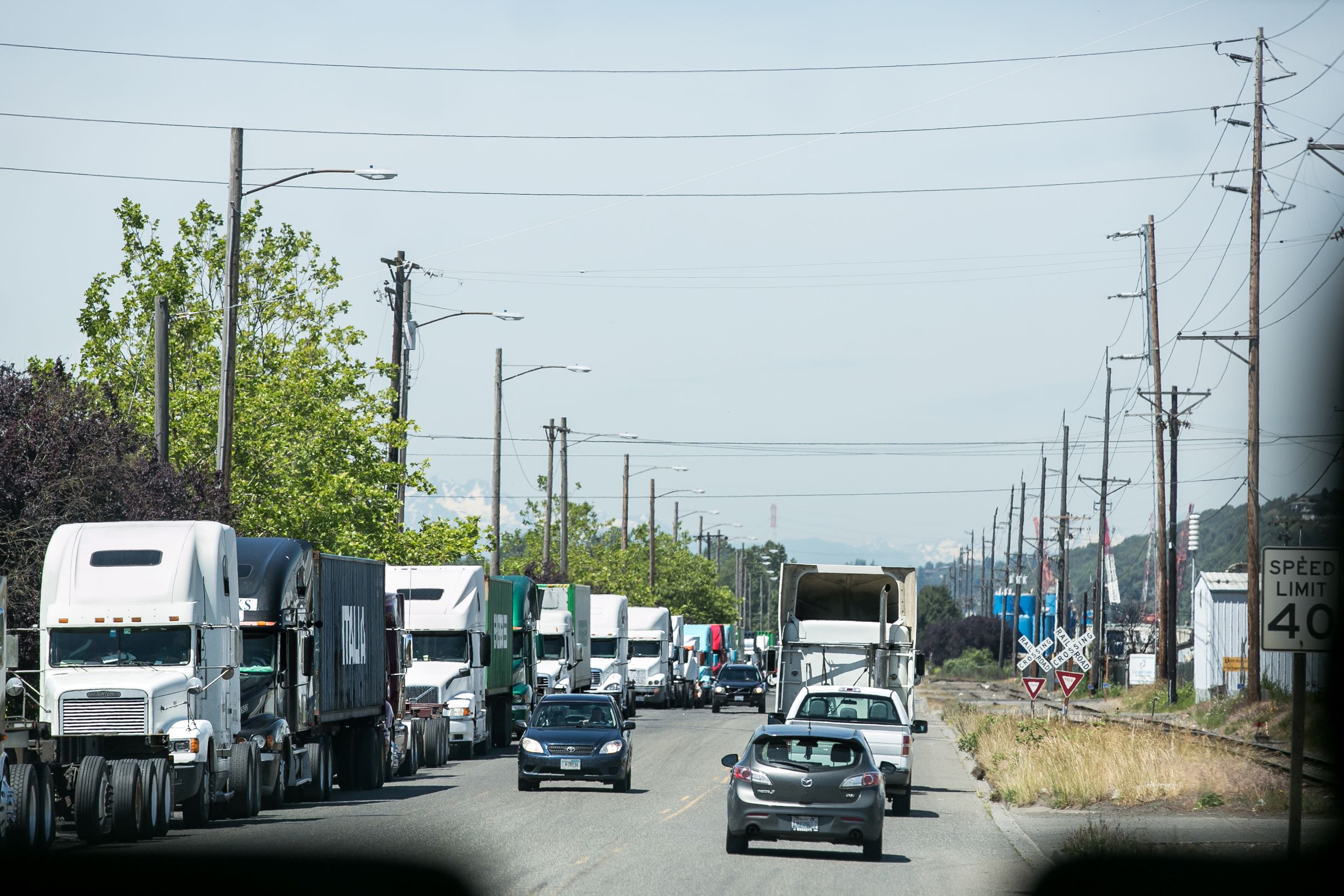 The Puget Sound Gateway Program (SR 167 and SR 509 completion) is two projects in one—SR 509 connects SeaTac to the Kent Valley and SR 167 connects the Port of Tacoma to Sumner and Puyallup. $873 million has been allocated to this project over the next two years and is currently in stage two of construction. This project will allow for a tolled expressway from I-5 to the Port of Tacoma. The total cost for this project will be $2.2 billion, and once complete, it will greatly improve the movement of goods to the Port of Tacoma. This project also funds a shared use trail for pedestrian and bicycle travel from Puyallup to Tacoma.
The Puget Sound Gateway Program (SR 167 and SR 509 completion) is two projects in one—SR 509 connects SeaTac to the Kent Valley and SR 167 connects the Port of Tacoma to Sumner and Puyallup. $873 million has been allocated to this project over the next two years and is currently in stage two of construction. This project will allow for a tolled expressway from I-5 to the Port of Tacoma. The total cost for this project will be $2.2 billion, and once complete, it will greatly improve the movement of goods to the Port of Tacoma. This project also funds a shared use trail for pedestrian and bicycle travel from Puyallup to Tacoma.- Over the next two years, $7.7 million is funded for access improvements on the Port of Tacoma Road. This road is one of the major arterials serving the Port of Tacoma and is in desperate need of an upgrade. An additional $22 million to fund this work from 2025-2027 is projected.
- The state is matching $5 million in funding for the Tacoma Rail Battery-Electric Switcher Locomotive Replacement Project, which combined with federal and city funds will allow Tacoma Rail to purchase two electric locomotives. These will have a significant impact on carbon reduction and improving air quality in our region.
- Pierce Transit is the recipient of $15 million for its Tacoma- Spanaway Bus Rapid Transit project that will accelerate the frequency and run time along SR 7-Pacific Ave. This is the first BRT for Pierce Transit.
- The Northwest Seaport Alliance’s Port Drayage Zero Emission Pilot program has received $6.3 million from CCA auction funds to replace old diesel-emitting trucks. The new trucks will be electric and benefit our region by improving air quality and reducing carbon emissions.
Important Capital Projects in the 27th Legislative District
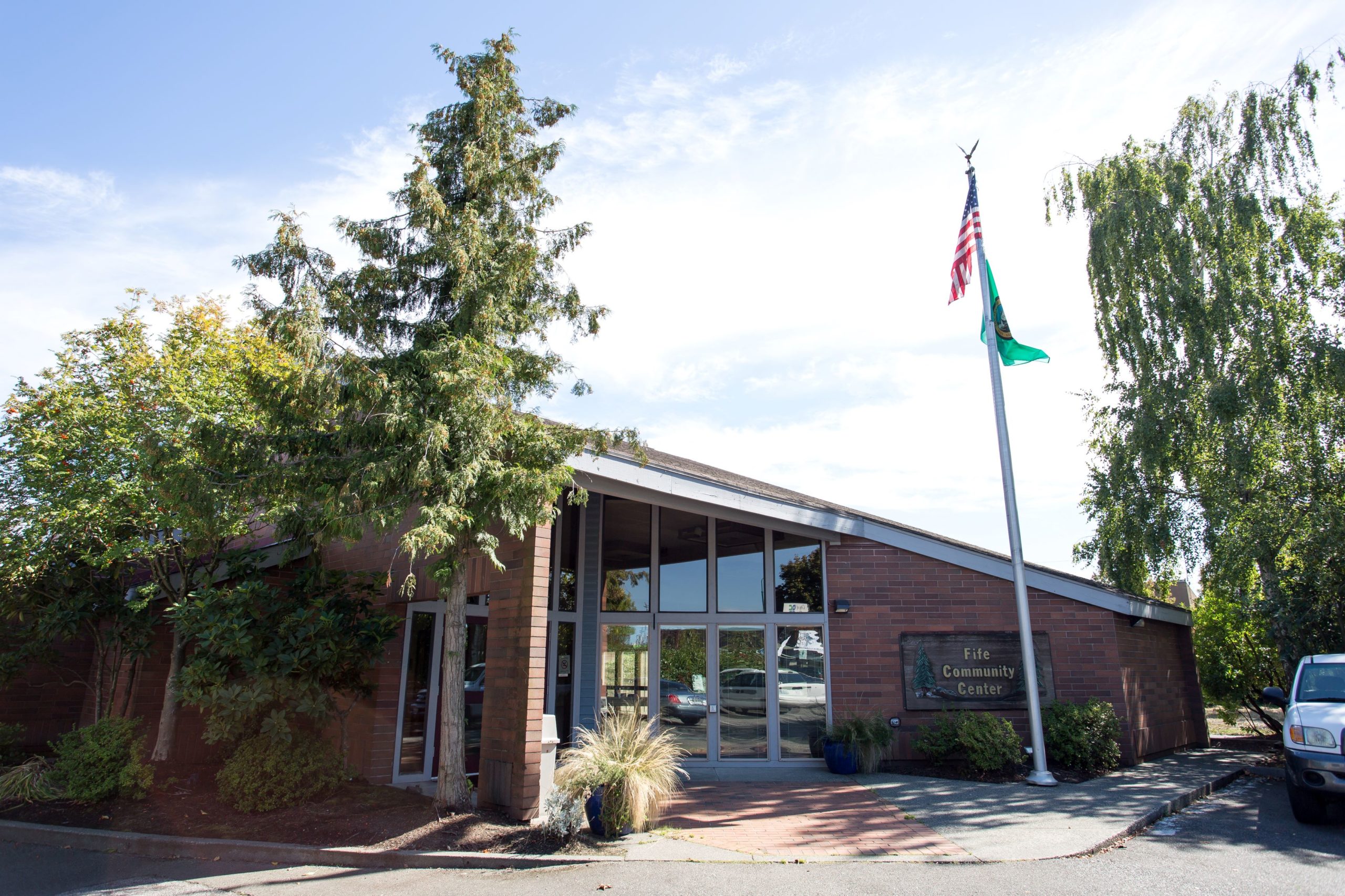
- $1 million for Shiloh Baptist Church to provide affordable housing
- $2 million to build a new Asian and Pacific Islander Cultural Center at the current APCC location
- $1.5 million to make critical repairs to the Fife Aquatic and Community Center
- $2.4 million for the CLR Certified Community Behavioral Health Center
- $90,000 for the Latino Arts and Culture Community Center
- $3 million for the Scott and Sis Names Family YMCA community center
- $3.5 million for the Sea Mar Community Health Center in Tacoma
- $2.5 million to the Multicultural Child and Family Hope Center for their Cora Whitley Family Center, which will hopefully expand childcare options in the district
- $226,000 for the Multicultural Youth Recreation Facility
- $7.7 million for the UWT Campus Land Acquisition to ensure that UWT can continue to grow their Tacoma campus
- $2 million for the Tacoma Public Library
- $5 million Lincoln District Family Housing
Dash Point/Browns Point Annexation
At the request of a number of citizens in the Dash Point/Browns Point area, SHB 1620 was introduced (and passed – it becomes law on July 23) to allow residents to consider the full range of options for local governance. Residents wanted to be able to consider incorporation as one of the options for governance. State law prevented areas with the population of the Dash Point/Browns Point area to consider incorporation as a town. In the past, there was discussion of annexing the area to the City of Federal Way or the City of Tacoma in the hopes that the area would see improved services, particularly regarding public safety. Residents wanted the opportunity to consider through a public discussion process whether the area would be best served by annexation to another city, incorporation as their town or continued services provided by Pierce County. With the passage of SHB 1620 residents now have all options available to them.
Community Conversations
Our community conversations kick off next week! These are intended to be small group discussions so please stop by to ask questions or talk about issues that are important to you.
Thursday, July 13th from 2-3pm at the Fife Pierce County Library, 6622 20th St E, Fife, WA 98424
Thursday, July 27th from 6-7pm at the Center at Norpoint, 4818 Nassau Ave NE, Tacoma, WA 98422
Tuesday, August 29th from 11:30am-12:30pm at Heritage Coffee and Plant House, 2310 Court A, Tacoma, WA 98402
Tuesday, September 5th from 12:30-1:30pm at Tacoma Public Library South Tacoma Branch, 3411 S 56th St, Tacoma, WA 98409
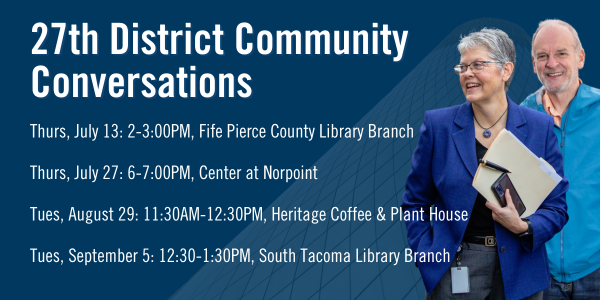
The WA Cares website has launched!
Washington Cares will help provide critical access to long-term care; most people don’t have long-term care insurance policies or enough savings to pay for the care they will need as they age. Even those who do have private long-term care policies can find themselves struggling when benefits are delayed or denied. You can learn more about the program and what it will cover here.
2023 Session Victories: Reproductive Care and LGBTQ Rights
Dear friends and neighbors,
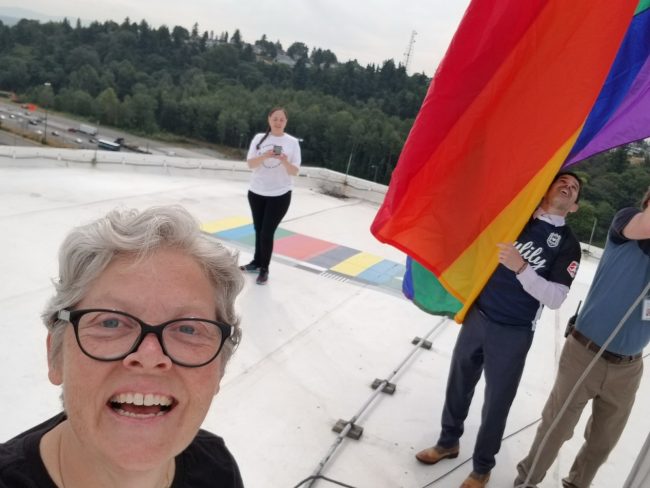
Over the last year I’ve found myself thinking about Washington’s role as a beacon of hope.
June is Pride month for most of the nation (although Tacoma celebrates Pride in July) but this year we’re also recognizing the one-year anniversary of the overturning of Roe v. Wade.
Pride has always been an act of resistance, a celebration of the fact that queer people are here to stay, and that we deserve equal rights, protections, and access. Earlier this year the Secretary of State’s office had an event celebrating the 10th anniversary of marriage equality in Washington state. In my remarks I reflected on how much has changed in my lifetime, and the courage from so many people who helped make that change possible. As other states enact cruel and discriminatory policies designed to actively harm transgender youth, eliminate queer people, and push us out of public life, we need to be courageous in our defense and support of LGBTQ people, especially our youth.
Similarly, across the nation we’ve seen a coordinated attack on abortion access, reproductive health care, and bodily autonomy. Last year the Supreme Court of the United States decided to undo longstanding legal precedent to strip away rights from millions of people. Since then, many states have restricted or banned abortions and other kinds of reproductive care. The people of Washington state enshrined abortion access into state law by initiative, and we’ve expanded those protections through legislation and budgetary investments.
However, if there is anything I’ve learned in over 30 years of advocacy, the work continues. Below I’ll go over some of the work we did this session to expand protections for LGBTQ people and for people accessing reproductive care.
I am immensely proud of Washington for being a place people can look to for hope. I hope you are, too.


This session we solidified access to abortions and reproductive care.
We passed legislation shielding patients and providers of reproductive care and gender-affirming care from retribution by other states. By ensuring that states like Texas cannot reach into Washington to implement their archaic and punitive laws, we can ensure care remains available for people who need it in Washington state.
We also passed the My Health, My Data Act which protects the right to reproductive care by blocking websites and apps from collecting and sharing sensitive health data.
We know that protecting access to abortion, reproductive care, and gender-affirming care in Washington also means protecting our providers. We passed legislation to ensure they cannot be disciplined for providing care in accordance with Washington state law, no matter where their patients live.
Finally, we passed legislation ensuring that Washingtonians will continue to have access to a safe abortion pill, Mifepristone, regardless of pending federal lawsuits.
These bills are supported by a $24 million investment in reproductive health services to ensure that Washington providers can meet the increased need for services in our state as people come here to get the care they need.

LGBTQ people are under attack across the country, with much of the focus on the transgender community and LGBTQ youth. That’s why we expanded protections for LGBTQ people this session, with a focus on protecting those most at risk.
I mentioned gender-affirming care in a couple of the reproductive rights bills; that ensures providers can continue to offer gender-affirming care, whether their patients live in Washington state or somewhere else, without fear of retaliation from states that oppose bodily autonomy.
In addition to those protections, we passed legislation to help get homeless transgender youth into housing, offering protections for homeless youth seeking gender-affirming treatment. We also passed legislation that makes it easier to seal name change records, protecting transgender people and making it safer for them to seek housing, employment, or medical care.
The data on mental health for LGBTQ youth and particularly transgender youth is devastating. These kids need a loving and supportive community, and they need to be able to see a future where they can live and thrive. I hope Washington can help provide that hope.

I’d also like to remind you about my upcoming community conversations. These are intended to be small group discussions so please stop by to ask questions or talk about issues that are important to you!
Thursday, July 13th from 2-3pm at the Fife Pierce County Library, 6622 20th St E, Fife, WA 98424
Thursday, July 27th from 6-7pm at the Center at Norpoint, 4818 Nassau Ave NE, Tacoma, WA 98422
Tuesday, August 29th from 11:30am-12:30pm at Heritage Coffee and Plant House, 2310 Court A, Tacoma, WA 98402
Tuesday, September 5th from 12:30-1:30pm at Tacoma Public Library South Tacoma Branch, 3411 S 56th St, Tacoma, WA 98409
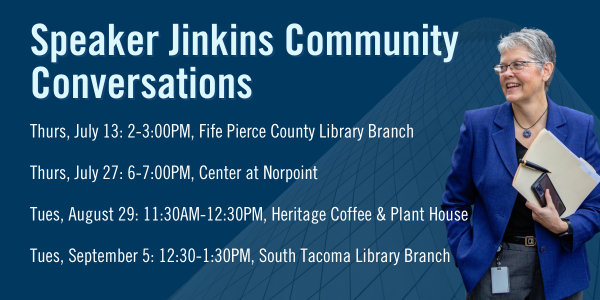




 This fall we’re wrapping up from another record-breaking hot summer and looking at the rest of what’s on track to be the hottest year in recorded history. If that sounds familiar, it should. The last eight years are also the hottest eight years on record.
This fall we’re wrapping up from another record-breaking hot summer and looking at the rest of what’s on track to be the hottest year in recorded history. If that sounds familiar, it should. The last eight years are also the hottest eight years on record.